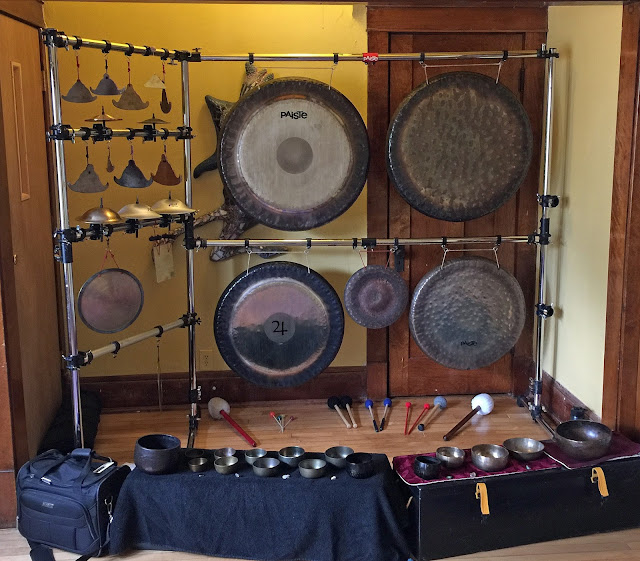This Business of Cultural Appropriation.
Cultural Appropriation. This has become a hot topic as of late. I've read various articles by natives from different cultures about how people are “stealing their culture,” especially in the Yoga/spiritual community, a place where I—and I'm sure a lot of you readers—work.
appropriation |əˌprōprēˈāSHən| noun1 the action of taking something for one's own use, typically without the owner's permission: the appropriation of parish funds.
The big question is, who owns culture?
In today's internet connected global village, this becomes an increasingly difficult question to answer. I recently read an article by an Indian woman about her experiences of going to a Yoga studio here in America. She was appalled by how many white, suburban people used things from here native culture without really knowing what they meant. This was especially true of the now generic use of namaste by everyone. She went on to write about this and other things, like dress, gestures, and even Yoga itself, and how what they were doing was really disconnected from the origins and true meaning back in India. She felt it was disrespectful.
It truly is a global village today. Even just 20 or 30 years ago we did not have the universal and instantaneous access to global culture. I must admit, that there has been a wholesale plundering of other cultures, mainly by the West, in the name of commercialism and selling more 'product.' But it goes both ways.
The Plundering of America
How many other countries have been fascinated with American culture? Things like the wild west, cowboys & Indians, fashion, food, and especially music. America invented country, jazz, and rock music. Now you see/hear these styles of music in every other country around the globe. For better or worse, many other cultures have taken their indigenous music and put it to a rock drum beat. Asia has a particular fondness for all things Western. Much of the popular music styles, like J-Pop, K-Pop, etc, directly mimics Western style clothes and western style pop music.
Even the early Beatles and Rolling Stones (like many other British bands of the time) based their music on American artists, like many of the early rock and rollers and all sorts of black blues artists. In fact, Buddy Holly was such an influence on the Beatles that their name was a direct response to Holly's band being called the Crickets! British hard rock stalwarts, and arguably the most popular rock band ever, Led Zeppelin, made a career out of plundering old American bluesmen and their songs.
The thing is, today's world really is one big melting pot of people and cultures. It can't be stopped. This mixing of cultures will just keep going on. But it is important to to look at certain things, especially when they are deeply rooted and have a spiritual significance, that you just don't take them and use them without knowing what they are all about. Again, the Yoga/spiritual community is often guilty of this, even though many native Indians who have come to America, are the biggest proponents of selling their own culture for the almighty dollar.
Respect Goes A Long Way
So if you work with sound, and work a lot at Yoga and spiritual centers, be respectful of the Indian, Sikh, Buddhist, etc. traditions and cultures. Don't just do/say/take something because it's in fashion. Do some research. Ask a native about it. Read a book. Research it on the web. It's important to do your homework so that you can both respect and understand traditions from other cultures.
When it comes to using Gongs, Singing Bowls, Bells, and other ritual instruments, do your homework! If you are serious about what you do, you need to know the history, background, and authentic uses of these instruments. Don't just buy a Singing Bowl and think that is it. You will be better off for your investigations and better able to serve those you are playing for.
Using and promoting a sort of faux culture is just being ignorant of the real culture. You are better than that.
~ MB
appropriation |əˌprōprēˈāSHən| noun1 the action of taking something for one's own use, typically without the owner's permission: the appropriation of parish funds.
The big question is, who owns culture?
In today's internet connected global village, this becomes an increasingly difficult question to answer. I recently read an article by an Indian woman about her experiences of going to a Yoga studio here in America. She was appalled by how many white, suburban people used things from here native culture without really knowing what they meant. This was especially true of the now generic use of namaste by everyone. She went on to write about this and other things, like dress, gestures, and even Yoga itself, and how what they were doing was really disconnected from the origins and true meaning back in India. She felt it was disrespectful.
It truly is a global village today. Even just 20 or 30 years ago we did not have the universal and instantaneous access to global culture. I must admit, that there has been a wholesale plundering of other cultures, mainly by the West, in the name of commercialism and selling more 'product.' But it goes both ways.
The Plundering of America
How many other countries have been fascinated with American culture? Things like the wild west, cowboys & Indians, fashion, food, and especially music. America invented country, jazz, and rock music. Now you see/hear these styles of music in every other country around the globe. For better or worse, many other cultures have taken their indigenous music and put it to a rock drum beat. Asia has a particular fondness for all things Western. Much of the popular music styles, like J-Pop, K-Pop, etc, directly mimics Western style clothes and western style pop music.
J-Pop band: where have you heard/seen this before?
Even the early Beatles and Rolling Stones (like many other British bands of the time) based their music on American artists, like many of the early rock and rollers and all sorts of black blues artists. In fact, Buddy Holly was such an influence on the Beatles that their name was a direct response to Holly's band being called the Crickets! British hard rock stalwarts, and arguably the most popular rock band ever, Led Zeppelin, made a career out of plundering old American bluesmen and their songs.
Isn't all this cultural appropriation?
The thing is, today's world really is one big melting pot of people and cultures. It can't be stopped. This mixing of cultures will just keep going on. But it is important to to look at certain things, especially when they are deeply rooted and have a spiritual significance, that you just don't take them and use them without knowing what they are all about. Again, the Yoga/spiritual community is often guilty of this, even though many native Indians who have come to America, are the biggest proponents of selling their own culture for the almighty dollar.
Respect Goes A Long Way
So if you work with sound, and work a lot at Yoga and spiritual centers, be respectful of the Indian, Sikh, Buddhist, etc. traditions and cultures. Don't just do/say/take something because it's in fashion. Do some research. Ask a native about it. Read a book. Research it on the web. It's important to do your homework so that you can both respect and understand traditions from other cultures.
When it comes to using Gongs, Singing Bowls, Bells, and other ritual instruments, do your homework! If you are serious about what you do, you need to know the history, background, and authentic uses of these instruments. Don't just buy a Singing Bowl and think that is it. You will be better off for your investigations and better able to serve those you are playing for.
Do you really know what this means?
- Do you really know anything about the sanskrit words you may use?
- Do you really know anything about the cultural fashions you may wear?
- Do you really know anything about the instruments you play?
Using and promoting a sort of faux culture is just being ignorant of the real culture. You are better than that.
~ MB
Chop Water / Carry Wood / Play Gongs™





This article has made a few good points about educating yourself, but your original premise about cultural appropriation is basically minimizing and white washing the issue. "How many other countries have been fascinated with American culture?" is a ridiculously invalid argument. First I would point out that the Beatles (which you bring up) were fascinated with the African American roots of rock and roll, which would be extremely different than white middle class "roots", which is the privileged, dominant part of the United States. Secondly, "American culture" is not the oppressed minority in the world. The US is the largest force of imperialism on earth, so another culture being "fascinated" with the US cannot be considered appropriation, since they are not the country oppressing us. Please re-take "Cultural Appropriation 101", before writing an article about it. Meanwhile, I recommend a much more clearly written article about this, from UPLIFTCONNECT.COM, which is entitled "8 Signs Your Yoga Practice Is Culturally Appropriated". It is not strictly dealing with sound healing, but the basic principles can be applied.
ReplyDelete